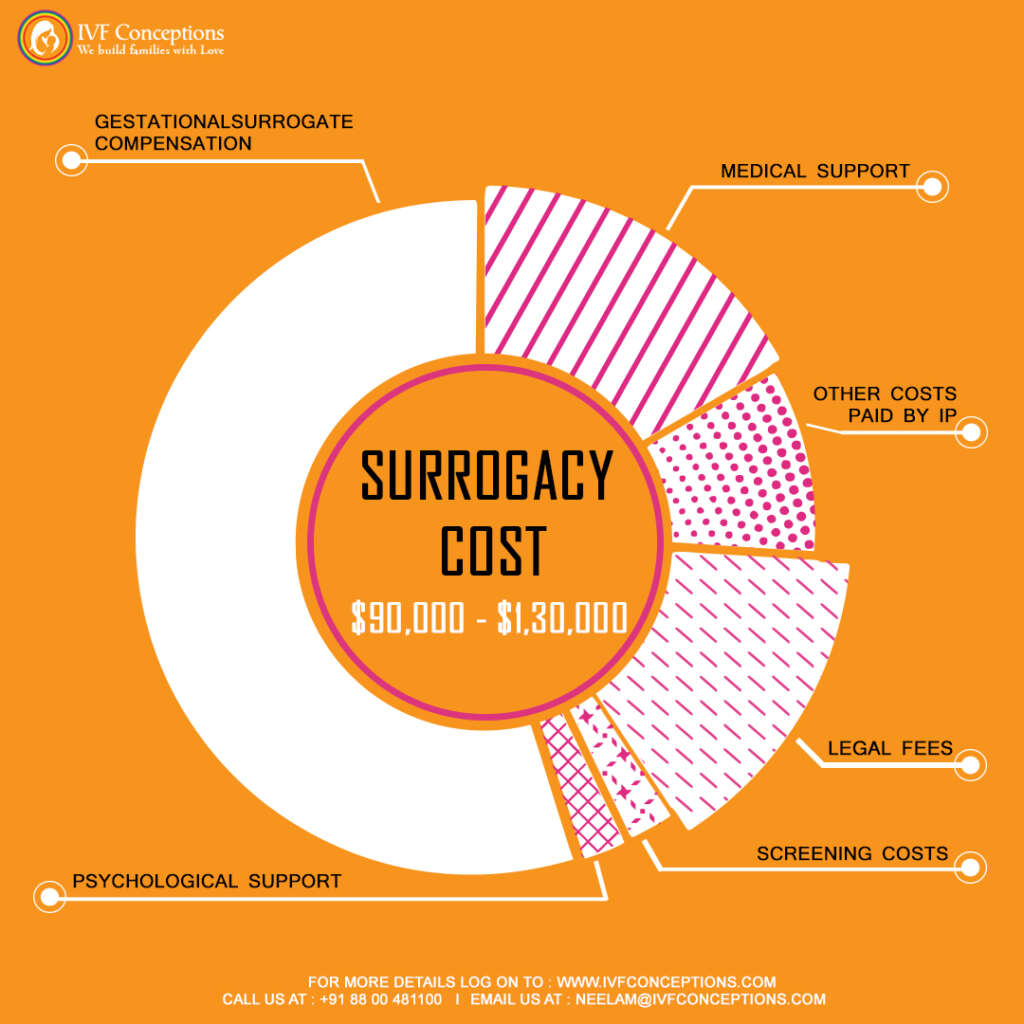What is commercial surrogacy?
Welcome to our comprehensive guide on commercial surrogacy. If you are considering surrogacy as a means to build your family or are simply interested in learning more, this article will provide you with all the information you need to know. Commercial surrogacy, also known as compensated surrogacy, is a surrogacy arrangement in which a surrogate mother is financially compensated for carrying and delivering a baby on behalf of intended parents.
- Book an online appointment: Get a free online consultation.
- Call\W:+91-8800481100 Email:neelam@ivfconceptions.com
Unlike altruistic surrogacy, where the surrogate mother does not receive any financial compensation beyond the reimbursement of medical expenses, commercial surrogacy involves a legal agreement and additional financial compensation for the surrogate’s services.
Additional Resources To Read:
Surrogacy for LGBT Couples: Your Path to Parenthood
Cheapest Countries for Gay Surrogacy
Best Countries for Surrogacy in 2024
What is commercial surrogacy definition
In a commercial surrogacy arrangement, the surrogate mother is not genetically related to the child she carries. Instead, the intended parents provide their own genetic material or use donated genetic material to create embryos through in vitro fertilization (IVF). The embryos are then transferred to the surrogate mother’s uterus, where she carries the pregnancy to term. Commercial surrogacy has provided hope and the opportunity for individuals and couples who are unable to conceive and carry a pregnancy on their own to experience the joys of parenthood.
The surrogacy process can be complex and requires the involvement of a surrogacy agency or professional to ensure all legal and ethical aspects are addressed. It is crucial for intended parents and surrogate mothers to understand the entire process and have the necessary support throughout their surrogacy journey.
Key Takeaways:
- Commercial surrogacy involves financial compensation for the surrogate mother.
- Surrogate mothers in commercial surrogacy arrangements are not genetically related to the child.
- The surrogacy process requires the involvement of a surrogacy agency or professional.
- Intended parents provide their own genetic material or use donated genetic material to create embryos for transfer.
- Commercial surrogacy offers hope for individuals and couples struggling with infertility.
- Cost of commercial surrogacy is more than other types of surrogacy
Types of Surrogacy
The gestational surrogacy process involves different types that cater to the unique needs and circumstances of intended parents and surrogate mothers. Understanding the different types of surrogacy can help individuals and couples make informed decisions when exploring this assisted reproductive option.

Gestational Surrogacy
In gestational surrogacy, the surrogate mother carries a pregnancy created through in vitro fertilization (IVF) using the genetic material of the intended parents or donors. This type of surrogacy allows individuals or couples who cannot conceive or carry a pregnancy to have a biological child.
The gestational surrogacy process involves several steps. First, the intended parents or donors undergo egg and sperm retrieval, which is then used in the IVF procedure to create embryos. These embryos are transferred to the surrogate mother’s uterus, which carries the pregnancy to term. Throughout the entire process, the surrogate mother has no genetic connection to the child, as the embryos are created using the genetic material of the intended parents or donors.
Traditional Surrogacy
Traditional surrogacy is a less common type of surrogacy arrangement. In this case, the surrogate mother uses her own eggs to conceive and carry a pregnancy for the intended parents. Unlike gestational surrogacy, the surrogate mother is genetically related to the child she carries.
Traditional surrogacy may involve artificial insemination or other fertility treatments to facilitate pregnancy. It requires careful consideration due to the legal and emotional complexities involved, as it blurs the lines of genetic parentage.
It’s important for intended parents and surrogate mothers to thoroughly understand the differences between gestational and traditional surrogacy, as well as the legal and emotional implications associated with each type.
Altruistic Surrogacy
Altruistic surrogacy, on the other hand, involves a surrogate who chooses to carry and deliver a child for the intended parents without receiving financial compensation beyond covering medical expenses and other reasonable costs associated with the pregnancy and birth. This type of surrogacy is often motivated by a desire to help others build their families out of compassion and goodwill.
Independent Surrogacy
Independent surrogacy refers to arrangements made directly between the intended parents and the surrogate, without the involvement of a surrogacy agency or third-party organization. These arrangements are often facilitated through online forums or personal connections, and the parties involved are responsible for navigating the legal, medical, and logistical aspects themselves.
Sure, here’s a table summarizing the different types of surrogacy:
| Type of Surrogacy | Description |
|---|---|
| Commercial Surrogacy | The surrogate receives financial compensation beyond covering medical expenses and other reasonable costs associated with the pregnancy and birth. |
| Altruistic Surrogacy | The surrogate does not receive financial compensation, beyond covering expenses related to the pregnancy and birth. The motivation is often to help others build their families. |
| Gestational Surrogacy | The surrogate is not genetically related to the child she carries. The embryo is created using the intended parents’ egg and sperm (or donor gametes) through IVF and transferred to the surrogate’s uterus. |
| Traditional Surrogacy | The surrogate is genetically related to the child she carries, as her own egg is used for fertilization, typically with the intended father’s sperm. |
| Independent Surrogacy | The arrangement is made directly between the intended parents and the surrogate, without the involvement of a surrogacy agency or third-party organization. |
This table outlines the key differences between the various types of surrogacy arrangements, based on the financial aspect (commercial vs. altruistic), the genetic relationship between the surrogate and the child (gestational vs. traditional), and the involvement of a surrogacy agency or intermediary (independent vs. agency-assisted).
It’s crucial for intended parents and surrogates to carefully consider the legal, emotional, and ethical implications of each type of surrogacy before making a decision. Seeking guidance from experienced professionals, such as surrogacy agencies, reproductive lawyers, and counselors, can help ensure a smooth and well-informed surrogacy journey.
Cost of Commercial Surrogacy

So, how much does average commercial surrogacy cost with a breakdown of the expense?
The cost of commercial surrogacy can vary depending on various factors, including location, agency fees, medical expenses, and surrogate compensation. In the United States, the estimated cost of commercial surrogacy ranges from $100,000 to $150,000, including medical expenses, legal fees, agency fees, and surrogate compensation. Surrogate mothers are typically compensated for their time, effort, and any potential physical and emotional risks associated with the surrogacy process.
It is important for intended parents to thoroughly understand the financial obligations and budget accordingly when considering commercial surrogacy. The commercial surrogacy cost can be a significant investment, but it is essential to prioritize the well-being of both the intended parents and the surrogate mother.
Before embarking on the surrogacy journey, it is crucial to consult with experienced professionals and research the potential financial ramifications. This will help ensure that all parties involved are aware of the financial commitments, including medical expenses, legal fees, and surrogate compensation.
Intended parents should also consider the financial stability and surrogate-friendly laws of the chosen surrogacy location, as these factors can impact the overall cost of the surrogacy journey. Working with a reputable surrogacy agency can provide valuable guidance and support in navigating the financial aspects of commercial surrogacy.
Here is a table for the cheapest countries for surrogacy:
| Country | Regulation & Organization | Who are allowed to participate | Surrogacy Cost | Legal Assurance |
|---|---|---|---|---|
| Colombia | Altruistic | Singles, gay couples, hetero couples | Affordable
$70,000 |
Reliable |
| Mexico | Altruistic | Singles, gay couples, hetero couples | Affordable
$70,000 to $80,000 |
Reliable |
| USA | Commercial | Singles, gay couples, hetero couples | Costly
$150,000+ |
Strong |
| Ukraine | Commercial | Hetero couples | Affordable
$60,000 |
Strong |
| Georgia | Commercial | Hetero couples | Affordable
$60,000 |
Strong |
| Greece | Altruistic | Hetero couples and single women | Affordable
$80,000 |
Strong |
Countries for Commercial Surrogacy
Different countries have varying regulations and laws regarding commercial surrogacy. Some countries, such as the United States, Ukraine, and Georgia have legal frameworks and well-established surrogacy industries that allow for commercial surrogacy arrangements.
For international surrogacy, it is important to work with experienced professionals and seek legal advice to navigate the legal regulations of different countries. It’s crucial to research and consider not only the legal implications but also the cultural and ethical factors involved before pursuing commercial surrogacy in a foreign country.
To help you better understand the global surrogacy landscape, take a look at the table below for an overview of popular surrogacy destinations:
Table with information on countries and their surrogacy laws:
| Country | Commercial Surrogacy | Altruistic Surrogacy | Surrogacy Status |
|---|---|---|---|
| Australia | Prohibited | Allowed | Altruistic surrogacy is legal in all jurisdictions. Commercial surrogacy is a criminal offense. |
| Canada | Banned | Allowed | Only altruistic surrogacy is permitted. Compensation for gestational carriers is limited to approved expenses. |
| Colombia | Uncertain | Allowed | There are no clear rules, but altruistic surrogacy is performed and well tolerated. |
| Greece | Banned | Allowed | Heterosexual couples, single females allowed. |
| India | Prohibited | Allowed | Altruistic surrogacy is permitted for certain couples based on medical and age criteria. |
| Israel | Allowed | Allowed | Gestational surrogacy is legal under the Embryo Carrying Agreements Law. |
| Kenya | N/A | N/A | No legal regulations/laws for surrogacy in Kenya. |
| Mexico | Allowed | N/A | Surrogacy, along with ovum and sperm donation, has been legal since 1992. |
| New Zealand | N/A | Allowed | Altruistic surrogacy is legal. |
| Thailand | Banned | N/A | Commercial surrogacy is criminalized under the Medical Council Act. |
| Ukraine | Allowed | Allowed | Surrogacy and egg/sperm donation are legal and supported by liberal laws. |
| United Kingdom | N/A | Allowed | Surrogacy laws vary across different states/territories in the UK. |
| United States | Varies by state | Allowed | Surrogacy laws vary by state, some are surrogacy-friendly, while others restrict or penalize commercial surrogacy. |
Disclaimer: The information provided in this table is subject to change, and it’s essential to consult with experienced professionals and legal experts for the most up-to-date regulations and requirements in each country.
Pros and Cons of Commercial Surrogacy
Pros of Commercial Surrogacy
The practice of commercial surrogacy offers several benefits for intended parents and surrogate mothers. Some of the pros of commercial surrogacy include:
- Hope for individuals and couples: Commercial surrogacy provides hope for individuals and couples who are unable to conceive or carry a pregnancy on their own. It offers a viable option for starting or expanding their families.
- Fair compensation for surrogate mothers: Surrogate mothers who participate in commercial surrogacy arrangements are fairly compensated for their time, effort, and potential physical and emotional risks associated with the surrogacy process. This compensation acknowledges the valuable contribution they make.
- Legally protected and regulated: In countries with well-established legal regulations, commercial surrogacy offers intended parents a legally protected and regulated option to grow their families. These regulations help ensure the rights and responsibilities of all parties involved in the surrogacy journey.
- Surrogate Availability: IN countries where commercial surrogacy is allowed and surrogate mother compensation is fair, there are enough surrogates available with no or short waiting list. On the other hand, in countries where commercial surrogacy is not allowed, only altruistic surrogacy is allowed, and there is a long wait for surrogates, which can go up to years.
Cons of Commercial Surrogacy
While commercial surrogacy has its benefits, there are also several cons and concerns associated with this practice. These include:
- Ethical concerns: Ethical concerns have been raised regarding the potential exploitation of surrogate mothers and the commodification of human life. It is important to carefully consider the ethical implications and ensure the well-being and autonomy of all parties involved.
- Legal complications: The legal landscape surrounding commercial surrogacy can vary significantly across different countries or jurisdictions, leading to potential legal complications. Intended parents may encounter challenges related to parental rights, citizenship, and the enforcement of surrogacy agreements.
- Financial burdens: Surrogacy can be financially burdensome, with high costs associated with the process. These costs include surrogate compensation, medical expenses, legal fees, and other related expenses. It is important for intended parents to carefully consider the financial implications and plan accordingly.
| Pros of Commercial Surrogacy | Cons of Commercial Surrogacy |
|---|---|
| Hope for individuals and couples unable to conceive or carry a pregnancy | Ethical concerns regarding the potential exploitation and commodification of human life |
| Fair compensation for surrogate mothers | Legal complications due to varying regulations across jurisdictions |
| Legally protected and regulated process (in countries with established laws) | Financial burdens, including surrogate compensation, medical expenses, and legal fees |
| Availability of surrogate mothers, shorter waiting times | – |
The table outlines the key pros of commercial surrogacy, such as providing hope for intended parents, fair compensation for surrogates, legal protection in regulated countries, and availability of surrogate mothers. On the other hand, the cons include ethical concerns, legal complications due to varying regulations, and the potential financial burdens associated with the process.
Additional Resources to Read:
Surrogate Mother Cost in Georgia
Is surrogacy legal in Georgia Country?
Conclusion
Embarking on the journey of commercial surrogacy offers hope and possibilities for individuals and couples who are facing challenges with infertility. With the assistance of assisted reproduction techniques, intended parents can fulfill their dreams of having a child. However, it is crucial to approach this complex process with careful consideration of the legal, financial, and ethical aspects involved.
Whether you are an intended parent or a surrogate mother, it is essential to seek guidance from experienced professionals in the field of surrogacy. These experts can provide the necessary support and assistance throughout the entire surrogacy journey, ensuring that all legal requirements are met and that the emotional well-being of everyone involved is prioritized.
Commercial surrogacy offers a regulated and legal option for intended parents in their pursuit of parenthood. By working closely with professionals, you can navigate the intricate legal landscape and ensure that all necessary steps are taken to protect the rights and interests of all parties involved. Surrogate mothers play a vital role in this process, and their dedication and selflessness in helping others create a family should be acknowledged and appreciated.
With careful planning, support, and an understanding of the complexities involved, commercial surrogacy can provide a path to parenthood for those who may have otherwise been unable to conceive or carry a pregnancy. By addressing the legal, financial, and ethical considerations, commercial surrogacy can offer a lifeline for intended parents and the opportunity for surrogate mothers to make a profound and positive impact on the lives of others.
If you’d like to learn more about IVF, Egg Donation, or surrogacy services globally, check out the rest of our website at Georgia Surrogacy Agency. We offer legally secure and affordable surrogacy consulting services for FREE.
Our team has over 14 years of experience facilitating surrogacy arrangements, egg donation, and serving as an advocacy resource for infertile couples and LGBTQ individuals seeking to build families.
For more resources on IVF and Surrogacy, browse our other web page- IVF Conceptions.
For more resources on IVF and Surrogacy, browse our other web page- Complete Surrogacy.
More reference:
https://www.aljazeera.com/features/2023/9/6/georgia-plans-to-ban-commercial-surrogacy
https://ge.usembassy.gov/message-for-u-s-citizens-new-law-banning-surrogacy-planned-in-georgia/
FAQ
What is commercial surrogacy?
Commercial surrogacy refers to a surrogacy arrangement in which a surrogate mother is compensated for carrying and delivering a baby for intended parents. It involves a legal agreement and financial compensation for the surrogate’s services beyond the reimbursement of medical expenses. In commercial surrogacy, the surrogate mother is not genetically related to the child she carries.
What are the types of surrogacy?
There are two main types of surrogacy: gestational surrogacy and traditional surrogacy. In gestational surrogacy, the surrogate mother carries a pregnancy created through in vitro fertilization (IVF) using the genetic material of the intended parents or donors. In traditional surrogacy, the surrogate mother uses her own eggs to conceive and carry a pregnancy for the intended parents.
How much does commercial surrogacy cost?
The cost of commercial surrogacy can vary depending on various factors, including location, agency fees, medical expenses, and surrogate compensation. In the United States, the estimated cost of commercial surrogacy ranges from $100,000 to $150,000, including medical expenses, legal fees, agency fees, and surrogate compensation.
Which countries allow commercial surrogacy?
Different countries have varying regulations and laws regarding commercial surrogacy. Some countries, such as the United States, Canada, Ukraine, and Greece, have clear legal frameworks and well-established surrogacy industries that allow for commercial surrogacy arrangements.
What are the pros and cons of commercial surrogacy?
Commercial surrogacy offers hope for individuals and couples who are unable to conceive or carry a pregnancy on their own. Surrogate mothers are fairly compensated for their time, effort, and potential physical and emotional risks associated with the surrogacy process. In countries with well-established legal regulations, commercial surrogacy offers a legally protected and regulated option for intended parents to grow their families. However, ethical concerns have been raised regarding the potential exploitation of surrogate mothers and the commodification of human life. Legal complications can arise due to varying laws and regulations in different countries or jurisdictions.

Highly esteemed, authoritative, and trusted professional with a 14-year of experience in international surrogacy. Advocate for Secure, Legal, and Affordable International Surrogacy.
Neelam Chhagani, MA (Counselling Psychology) and Holistic Infertility and Third-Party Reproduction Consultant.
Member of European Fertility Society, Best Surrogacy Blogger of 2020, with 300 dedicated blogs, and top contributor on Quora for Surrogacy.



Add Your Comment